- Home
- Stephanie Laurens
THE LEGEND OF NIMWAY HALL: 1750 - JACQUELINE Page 4
THE LEGEND OF NIMWAY HALL: 1750 - JACQUELINE Read online
Page 4
Richard hid a smile and followed Hopkins from the hall.
As he’d assumed, the corridor led directly to a side door that opened to a short stretch of lawn on the other side of which the stable squatted, long and low in the fading light. The glow from a lamp inside the stable spilled out of the open door; inside, they found Young Willie leaning on the front of a stall and crooning to Malcolm the Great.
Young Willie had brushed the horse down and fed and watered him, for which Richard thanked him and surreptitiously slipped him a penny. Hopkins had already opened the stall door and, after offering the horse his hand and stroking the long nose, then the arching neck, had gone into the stall.
Having surveyed the dappled gray’s size, Hopkins grunted. “See what you mean about his name. Fits him, right enough. Now.” Hopkins bent and lifted the off foreleg, angling the hoof to the light. After a moment of studying the damage, he grunted again. “Young Willie—go fetch Ned Ostley.” The boy instantly raced off. Hopkins glanced up at Richard. “Ostley’s our farrier. He’s the best one to see to this.”
Richard blew out a breath. “I thought it would take a farrier—I’m just glad you have one.”
“Oh aye—we have most of the trades here.” Hopkins gently set down the damaged hoof, leaned against the side of the stall, and folded his arms, clearly prepared to talk while they waited for the farrier to arrive. “An old estate, you see, and we’re a mite isolated, what with the wood all around and the escarpment to the west.”
Richard propped a shoulder against the front of the stall, more than willing to exploit the situation. “I was on my way to Wells when I got lost. I found your woodcutter, and he and his wife brought me here.” He tipped his head toward the house. “They said the celebration was something to do with an old spring running again.” The woodcutters hadn’t seemed to know more, and not wanting to advertise his interest, he hadn’t pried.
Hopkins nodded. “Aye. See, our stream’s been running low. Very low. We didn’t get the flush we usually do after the winter thaw. Our farmers were getting into a pother—not enough water would make for a hard year. And the mill can’t run, not with the stream so low, so that’s another worry—even if they get the crops in, they’ll have to pay for someone else to mill the grain. But the mistress, Miss Jacqueline, remembered about the old lake.” Hopkins tipped his head beyond the rear of the house. “Used to be at the far end of the grounds, but it’s been dry for years. Seems the spring that fed it got plugged up somehow, but Miss Jacqueline had the dowser in, and this afternoon, they had the spring gushing again. So now the lake’s filling, and once it’s full, the estate will have water aplenty. We’ll still have to figure out how to supply the mill, mind, but if any of our farms need water, we’ll have it to give them. So that’s what the celebration’s about.” Hopkins eyed Richard—measuringly, much as Tregarth had done. “Might not seem such a big thing to you, but to us in the country, fixing a situation like that…it’s a victory of sorts. Worthy of celebration.”
Richard allowed an entirely genuine grin to split his face. “I might live in London for some of the year, but I was born and brought up in the country. So I fully appreciate the triumph of…Miss Jacqueline.” He arched his brows. “I presume she’s Mr. Tregarth’s daughter?”
“Nah—she’s his great-niece.” Hopkins straightened as the sound of heavy footsteps neared. “He’s her guardian, so to speak, ever since her parents died. It’s Miss Jacqueline who owns Nimway Hall.”
Richard blinked, but then a heavyset man arrived and introduced himself as Ned Ostley, the farrier. After taking a quick look at Malcolm’s damaged hoof, Ostley fetched his tools, and in short order, the offending sliver—a surprisingly thick and sharp-edged shaft of hardwood—was removed.
Both Ostley and Hopkins—along with Richard—studied Malcolm the Great’s subsequent reaction. The big horse still found the foot too sore to use. Hopkins grunted. “It’ll take a while to settle, no doubt. His weight…you wouldn’t want to rush him back into using it before he’s ready.”
“No, indeed.” Somewhat grim, Richard said, “We’ll see how he is tomorrow.”
The others grunted agreement, and leaving Young Willie to settle Malcolm, the three men returned to the great hall and the celebration that was still in full swing.
Richard estimated he’d been absent from the hall for about thirty minutes. He parted from Ostley and Hopkins with sincere thanks, then found himself offered a mug of ale and a pasty, both of which he gratefully accepted. The pasty, simple and hearty country fare, went some way to filling his empty stomach. Two more pasties and another mug of ale did the trick. Sufficiently fortified, he wondered which of the younger ladies he’d spotted in the crowd—all three of whom he was making a point of ignoring—was Miss Jacqueline Tregarth. Further wondering if he should find the housekeeper and retire rather than linger when he knew so few, he made his way back to the fireplace where Tregarth and Miss Swinford continued to hold court.
He’d only just rejoined them when, with a rustle of silks, the lady he’d noticed earlier—she of the assessing gaze and determined chin—stepped out of the crowd and halted beside Hugh Tregarth.
Richard realized he was about to meet the owner of Nimway Hall.
In confirmation, Miss Swinford fluttered and beamed at the lady. “There you are, Jacqueline. You must meet Mr. Montague—Richard Montague. Mr. Montague, please allow me to present my charge, Mr. Tregarth’s great-niece, Miss Jacqueline Tregarth.”
As Richard bowed and Miss Tregarth dipped into a regulation curtsy, Miss Swinford rattled on, “Mr. Montague was riding to Wells to visit a relative in the bishop’s household, but he got lost in our wood and his horse went lame, and so here he is, come to beg shelter.”
Miss Swinford lowered her restless hands to her lap, her face alight with satisfaction, apparently over having delivered such news. She looked from the lady to Richard, transparently pleased.
Richard felt Miss Swinford’s approving gaze, but didn’t meet it. His eyes were trapped, stare for stare, by the most striking blue-green gaze he’d ever seen. Miss Jacqueline Tregarth had eyes of mingled cerulean blue and spring green, both shades bright; she also possessed a gaze of such directness, of such unstated confidence and unshakeable inner strength, that the combination literally stole his breath.
It had been a long time—a very long time—since anything about a lady had rendered Richard Edward Montague Devries speechless.
Jacqueline studied Richard Montague with her customary outward calm, yet inside, to her surprise, she felt her senses fluttering, her nerves leaping, and a very real curiosity stirring. In other ladies—more susceptible ladies—she imagined he stirred another sort of interest entirely, but she knew herself to be fully armored against that particular weakness.
Regardless, it was, apparently, impossible not to react to his presence. He was of above-average height, with broad shoulders, a narrow waist, and long rider’s legs, and he moved in a way that marked him as quite different from the country gentlemen to whom she was accustomed. Richard Montague was a…the label her mind supplied was “warrior.” He wore a sword at his hip, and his fluid prowling gait was that of an experienced hunter.
Did he hunt through woods or ballrooms?
She suspected the answer was both.
The line of his lips was frankly sensual, the thickness of his dark hair a blatant invitation to feminine fingers to stroke, thread through, and grip. He wore the walnut-brown locks drawn back into a queue at the nape of his neck, exposing the chiseled planes of his face. His nose was a patrician blade, his chin rugged and uncompromisingly square, and his deeply set hazel eyes looked out on the world with—if she had to guess—a cynicism to match her own.
Certainly, the gaze she held was as unrevealing and as unapologetically assessing as hers.
She raised her chin a fraction and continued to meet his eyes. “Welcome, Mr. Montague. As I’m sure my uncle and my chaperon have assured you, you are welcome beneath this
roof.”
His lips quirked fractionally, then relaxed into an easy—practiced—smile, and he bowed again, remarkably elegantly. “Thank you, Miss Tregarth.”
She glanced at the door through which he’d returned to the hall. “Your horse, sir? Has it been stabled?”
“Thank you, yes. Your stableman and farrier have seen to him. They removed a splinter from his hoof, and we’ve agreed to see how he is come morning.”
The emotion that fleetingly shadowed his face suggested he was truly concerned for his steed. Her curiosity deepened. “Have you ridden far?”
His gaze returned to her face. He hesitated for a second, then replied, “I left London several days ago. I rode with a friend to Yeovil, and we parted there, and this morning, I turned north. I expected to reach Wells by this afternoon, but sadly, your wood defeated me.”
She widened her eyes. “I admit I’m surprised you didn’t keep to the lanes.” Most travelers did.
His lips thinned slightly as if in remembered irritation. “I might have had I known of the confounding nature of Balesboro Wood. However, as I’ve hunted since boyhood and in forests far larger and have never before encountered any difficulty in finding my way, striking north across country seemed the obvious and fastest route.”
She noticed Hugh snap to attention, his gaze focusing a great deal more sharply on their unexpected visitor. Before Hugh could commence an interrogation, she smoothly stated, “The folklore of these parts includes several tales of travelers getting lost in the woods.” Specifically, in Balesboro Wood. “The stories often involve some magical being that haunts the woodland and ensnares certain mortals.” She smiled reassuringly. “Of course, such tales are generally considered myths.”
A faint frown tangling his dark brows, he replied, “In light of my experience in your wood, I can understand how such tales come about.”
She’d expected him to laugh and dismiss all ideas of magical beings with a contemptuous wave.
She wasn’t at all sure what to make of Richard Montague. What was he doing there? Could she take his story at face value? Up to now, the gentlemen who had sought to woo her had openly ridden up to the house, more or less declaring their purpose, but if Richard Montague had heard of her and decided to make a bid for her hand, then she had to admit that gaining entry to the household by claiming shelter with a story of getting lost in her wood was a novel and effective way of getting past her first line of defense.
He was inside her walls and assured of a bed, at least overnight.
That in the process, his horse, who he plainly cared about, had picked up a splinter and gone lame might simply have been an unintended consequence of his plan.
“Will the bishop’s household be expecting you, Mr. Montague?” She had to wonder if that part of his tale was true.
“If they are,” Elinor hurried to say, “I’m sure we can send a messenger…” Her face clouded. “But it’s already late, so perhaps not until morning, and by then, you might be ready to journey on.”
Richard Montague smiled gently at the older woman. “I’m a frequent visitor to the palace at Wells, but this visit was a spur-of-the-moment decision, so they won’t be expecting me. And, as you say, if my horse recovers the use of his hoof quickly, I’ll be in Wells tomorrow.”
Elinor relaxed under the reassuring warmth of Montague’s smile. Jacqueline gave the man credit for being kind enough to calm her chaperon, who was a dear but prone to plunging into distracted and distracting flusters.
Based on that calming kindness and that Montague had, to that point, shown no signs of setting himself to charm her, she decided that, at least for the moment, she would proceed as if he was nothing more than he claimed—a traveler intent on reaching Wells who had been temporarily waylaid.
By Balesboro Wood.
Of course, it was early days yet.
She glanced around, her duty as lady of the manor tugging at her, yet she was reluctant to leave Montague to his own devices. “Perhaps, Mr. Montague”—she returned her gaze to his handsome face and coolly arched a brow—“you might accompany me on my rounds, and I can introduce you to some of our neighbors.”
He half bowed. “I am yours to command, Miss Tregarth.”
She seriously doubted that, but, when he gallantly offered his arm, consented to lay her fingertips on his sleeve. As he turned her toward the groups of people dotting the great hall, she tried to ignore the clamoring of her senses occasioned, evidently, by the feel of steely muscles beneath the cool fabric of his coat sleeve and the sheer impact of his powerful body in such close proximity to hers. Surreptitiously, she swallowed, then she tilted her chin upward and gestured to one of the nearer circles. “I should speak with Mr. Harris. He’s the local alderman.”
With a brief, acknowledging dip of his head, Montague led her to join the group.
Unsurprisingly, they were welcomed with undisguised interest and the avid curiosity of country folk on finding a stranger—an exceedingly handsome one who, despite his neat and conventional appearance, carried the dangerous edge of an experienced commander—suddenly in their midst.
Determinedly suppressing the effect he had on her, Jacqueline introduced him to Mr. and Mrs. Harris and the two other couples—the owners of neighboring smallholdings—then asked Mr. Harris about the upcoming wool fair.
“Indeed, Miss Tregarth.” The alderman puffed out his chest. “There was something of a battle between East Pennard and West Pennard, but in the end, it was decided to hold the fair in our usual field, to the west of West Pennard.”
“I have to admit,” Jacqueline said, “that that suits us rather better—driving our flocks across to East Pennard would have meant an extra day.”
“Aye—a lost day.” One of the other gentlemen nodded in agreement.
Mrs. Harris smiled at Montague. “You’re from London, sir? I daresay you find such pastimes as wool fairs and the like supremely boring.”
Montague returned her smile, his own one of easy, confident grace. “Although I spend much of my time in the capital, I’m not one to turn my back on country pleasures.” He glanced at the men. “And these days, the wool clip and similar harvests from the country form the backbone of our nation’s wealth—none of us should forget that.”
The comment had Jacqueline’s brows faintly rising and, of course, made Montague an instant ally of the men—farmers all. Montague’s attire, subdued and self-effacing though it was, his dark-brown coat relatively plain with simple gold buttons but devoid of braid or other showy embellishments, nevertheless marked him as hailing from London; given their quality, his garments couldn’t have originated from anywhere else.
Subdued his clothing might be, yet everything about him screamed of wealth.
The gold signet ring on his right hand and the jewel-encrusted hilt of the sword she’d seen peeking out from beneath his coat confirmed that assessment.
Whoever he was and whatever his reasons for being there, Richard Montague came from a wealthy family.
Given he was a Montague, there was little surprise in that.
They remained chatting with that group for several minutes, then Jacqueline touched Montague’s arm, and they made their excuses and moved on to the next knot of locals.
Once again, Montague proved to be a dab hand at reassuring others uncertain of how to deal with him. After making a joking comment about his woeful experience in her wood, he engaged the men in what evolved into a lively discussion of hunting in the neighborhood. Montague’s recollections of the sport to be had around Wells, and his ready exchanges with Mr. Willis and his son, Thomas, both of whom hunted in that area, left Jacqueline reasonably certain that Montague’s claim to be a frequent visitor at Wells was true.
As they moved from group to group, under cover of the chatter, she watched him closely, but somewhat to her surprise, he appeared to…subtly retreat from the ladies’ advances. Certainly, he deployed what she sensed was a shield of smiling yet steely reserve between him and those ladies who
, with their smiles and gushing comments, sought to draw him to them.
He resisted most definitely and remained by her side.
Yet he made no move to engage her, stoking her curiosity even more. Indeed, to a point where her escalating inquisitiveness made it easy to ignore her nonsensical, still-overactive senses.
Perhaps Richard Montague was exactly who and what he claimed to be and nothing more.
Regardless, he gained her very definite approval when, as they were passing through the crowd, he dipped his head to hers and murmured, “One moment, if you please.”
Then he diverted to where Hammond, one of the Hall’s woodcutters, was standing with his wife and several others, all workers on the estate.
All turned in some surprise, but bobbed bows and curtsies to her and to Montague.
Montague smiled upon them all, then settled his gaze on Hammond. “I wanted to thank you and your wife”—he dipped his head to Mrs. Hammond—“for taking pity on a stranger and bringing me here. Not everyone would have been so helpful.”
Hammond flushed and insisted that they’d done no more than what anyone would have, but Montague only smiled and inclined his head. “Nevertheless, I’m grateful to you both for your kindness and hope prosperity shines upon your labors.”
With that and a general, easy nod to the others, he steered Jacqueline on to the next group of guests.
After making the introductions, in response to several questions, she described calling in the dowser and finding the old spring, yet Montague making the effort to thank the Hammonds remained high in her mind. It had, quite simply, been a nice thing to do. And not something to which gentlemen of Montague’s ilk tended to stoop.
The longer she spent in his company, the higher Richard Montague rose in her estimation.
Apparently, without intending to.
Richard saw no reason not to stick by Miss Tregarth’s side—a decision that, once he realized he’d made it, struck him as distinctly odd; normally, he avoided the company of marriageable ladies like the plague. But Miss Tregarth had displayed not the faintest interest in claiming his attention for herself. Indeed, if asked to define how she viewed him, he would say “suspiciously.”

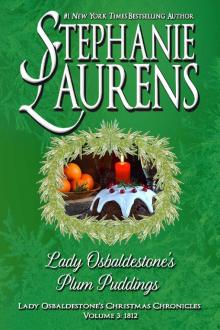 Lady Osbaldestone’s Plum Puddings: Lady Osbaldestone’s Christmas Chronicles Volume 3
Lady Osbaldestone’s Plum Puddings: Lady Osbaldestone’s Christmas Chronicles Volume 3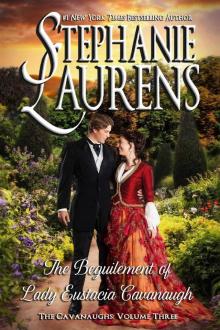 The Beguilement of Lady Eustacia Cavanagh: The Cavanaughs Volume 3
The Beguilement of Lady Eustacia Cavanagh: The Cavanaughs Volume 3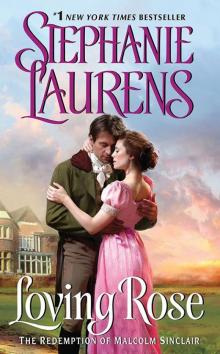 Loving Rose: The Redemption of Malcolm Sinclair (Casebook of Barnaby Adair)
Loving Rose: The Redemption of Malcolm Sinclair (Casebook of Barnaby Adair)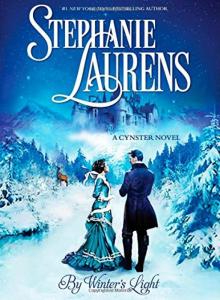 By Winter's Light
By Winter's Light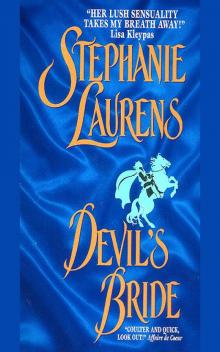 Devil's Bride
Devil's Bride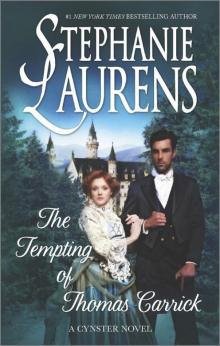 The Tempting of Thomas Carrick
The Tempting of Thomas Carrick![Cynster [22.00] A Match for Marcus Cynster Read online](http://i1.bookreadfree.com/i/03/16/cynster_[22_00]_a_match_for_marcus_cynster_preview.jpg) Cynster [22.00] A Match for Marcus Cynster
Cynster [22.00] A Match for Marcus Cynster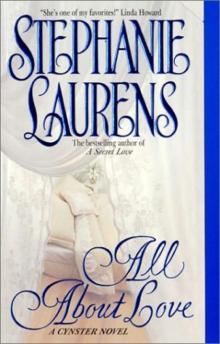 All About Love c-6
All About Love c-6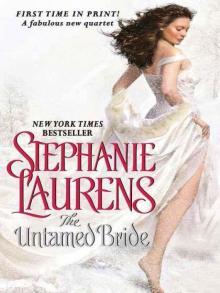 Cobra 01 The Untamed Bride
Cobra 01 The Untamed Bride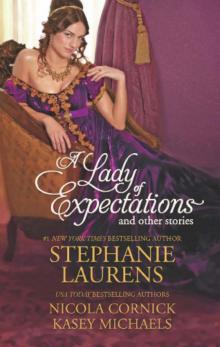 A Lady of Expectations and Other Stories
A Lady of Expectations and Other Stories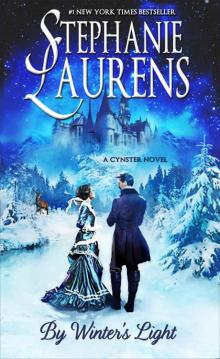 By Winter's Light_A Cynster Novel
By Winter's Light_A Cynster Novel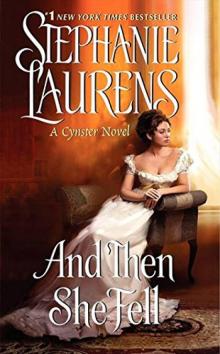 And Then She Fell
And Then She Fell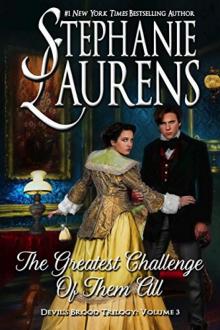 The Greatest Challenge of Them All
The Greatest Challenge of Them All The Edge of Desire
The Edge of Desire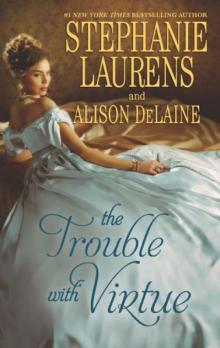 The Trouble With Virtue: A Comfortable WifeA Lady by Day
The Trouble With Virtue: A Comfortable WifeA Lady by Day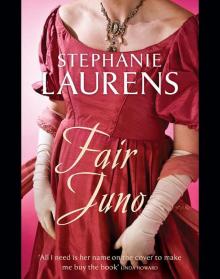 Fair Juno
Fair Juno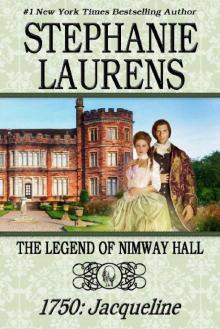 THE LEGEND OF NIMWAY HALL: 1750 - JACQUELINE
THE LEGEND OF NIMWAY HALL: 1750 - JACQUELINE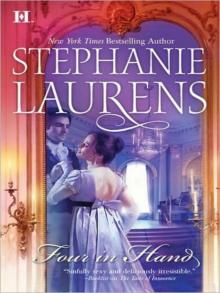 Four In Hand
Four In Hand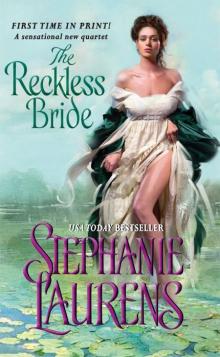 The Reckless Bride
The Reckless Bride Stephanie Laurens Rogues' Reform Bundle
Stephanie Laurens Rogues' Reform Bundle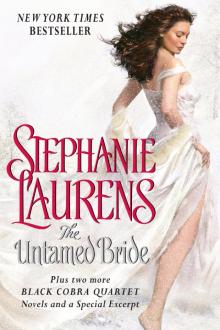 The Untamed Bride Plus Black Cobra 02-03 and Special Excerpt
The Untamed Bride Plus Black Cobra 02-03 and Special Excerpt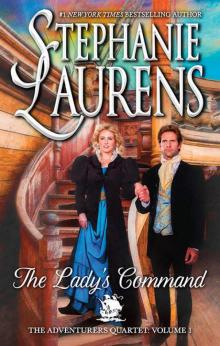 The Lady's Command (Adventurers Quartet #1)
The Lady's Command (Adventurers Quartet #1)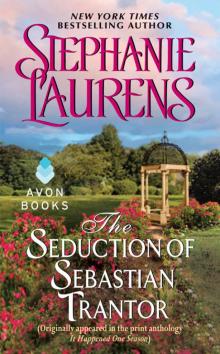 The Seduction of Sebastian Trantor
The Seduction of Sebastian Trantor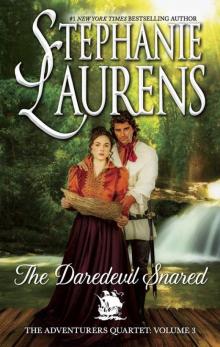 The Daredevil Snared (The Adventurers Quartet Book 3)
The Daredevil Snared (The Adventurers Quartet Book 3)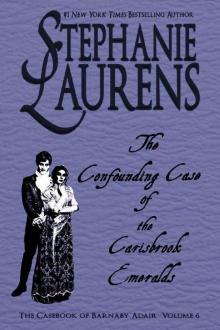 The Confounding Case Of The Carisbrook Emeralds (The Casebook of Barnaby Adair 6)
The Confounding Case Of The Carisbrook Emeralds (The Casebook of Barnaby Adair 6) Lord of the Privateers (The Adventurers Quartet)
Lord of the Privateers (The Adventurers Quartet)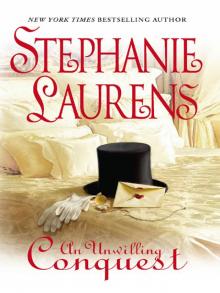 An Unwilling Conquest
An Unwilling Conquest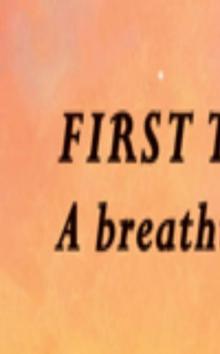 Brazen Bride
Brazen Bride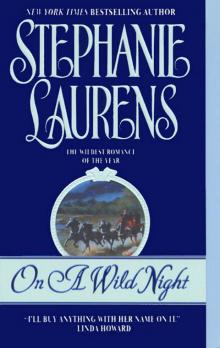 On a Wild Night
On a Wild Night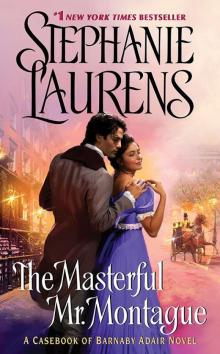 The Masterful Mr. Montague: A Casebook of Barnaby Adair Novel
The Masterful Mr. Montague: A Casebook of Barnaby Adair Novel Lord of the Privateers
Lord of the Privateers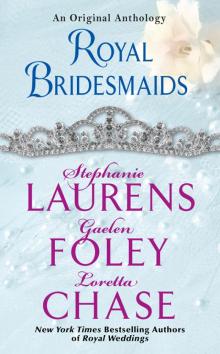 Royal Bridesmaids
Royal Bridesmaids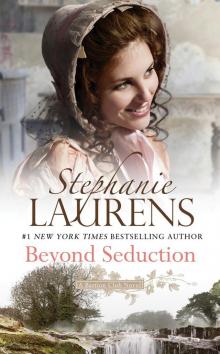 Beyond Seduction
Beyond Seduction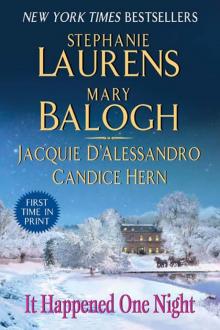 It Happened One Night
It Happened One Night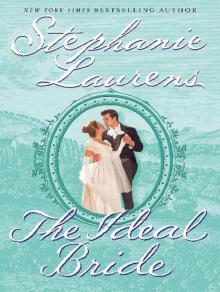 The Ideal Bride
The Ideal Bride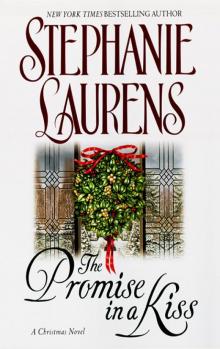 The Promise in a Kiss
The Promise in a Kiss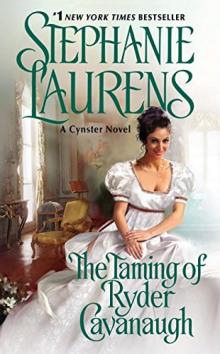 The Taming of Ryder Cavanaugh
The Taming of Ryder Cavanaugh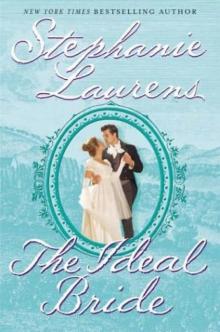 The Ideal Bride c-12
The Ideal Bride c-12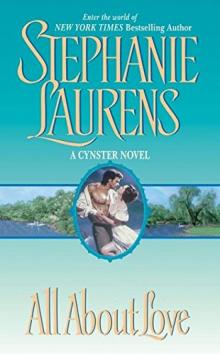 All About Love
All About Love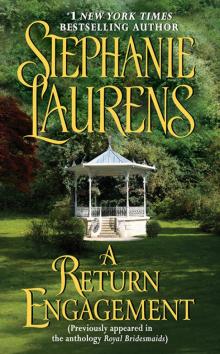 A Return Engagement
A Return Engagement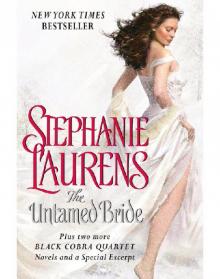 The Untamed Bride Plus Two Full Novels and Bonus Material
The Untamed Bride Plus Two Full Novels and Bonus Material Viscount Breckenridge to the Rescue
Viscount Breckenridge to the Rescue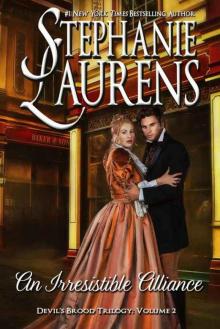 An Irresistible Alliance (Cynsters Next Generation Novels Book 5)
An Irresistible Alliance (Cynsters Next Generation Novels Book 5)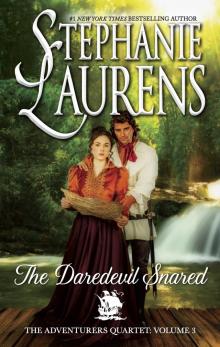 The Daredevil Snared
The Daredevil Snared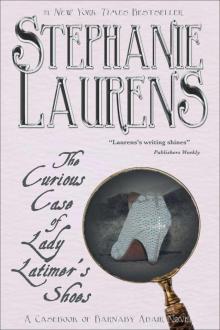 The Curious Case of Lady Latimer's Shoes: A Casebook of Barnaby Adair Novel
The Curious Case of Lady Latimer's Shoes: A Casebook of Barnaby Adair Novel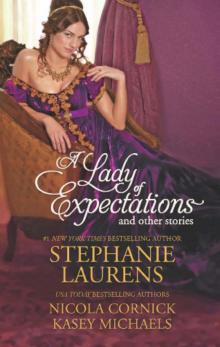 A Lady of Expectations and Other Stories: A Lady of ExpectationsThe Secrets of a CourtesanHow to Woo a Spinster
A Lady of Expectations and Other Stories: A Lady of ExpectationsThe Secrets of a CourtesanHow to Woo a Spinster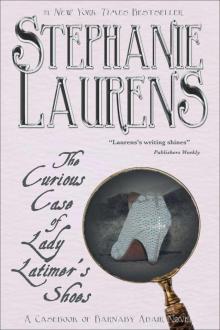 The Curious Case of Lady Latimer's Shoes: A Casebook of Barnaby Adair Novel (The Casebook of Barnaby Adair)
The Curious Case of Lady Latimer's Shoes: A Casebook of Barnaby Adair Novel (The Casebook of Barnaby Adair)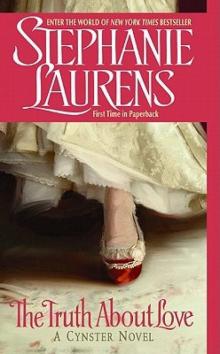 The Truth About Love
The Truth About Love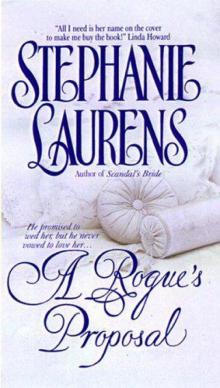 A Rogue's Proposal
A Rogue's Proposal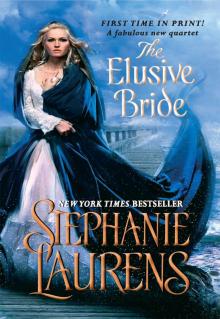 The Elusive Bride
The Elusive Bride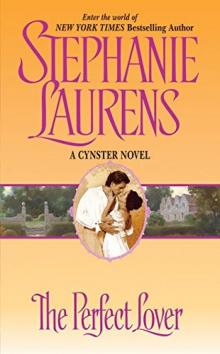 The Perfect Lover
The Perfect Lover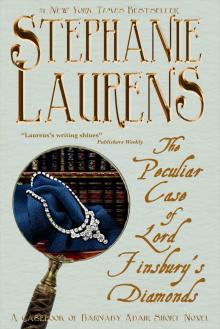 The Peculiar Case of Lord Finsbury's Diamonds: A Casebook of Barnaby Adair Short Novel
The Peculiar Case of Lord Finsbury's Diamonds: A Casebook of Barnaby Adair Short Novel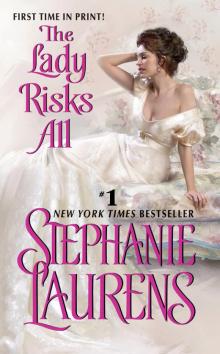 The Lady Risks All
The Lady Risks All The Murder at Mandeville Hall: The Casebook of Barnaby Adair: Volume 7
The Murder at Mandeville Hall: The Casebook of Barnaby Adair: Volume 7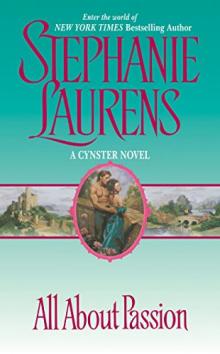 All About Passion
All About Passion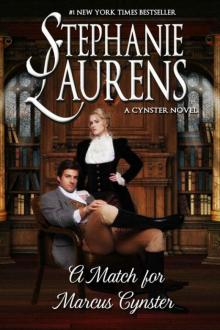 A Match for Marcus Cynster
A Match for Marcus Cynster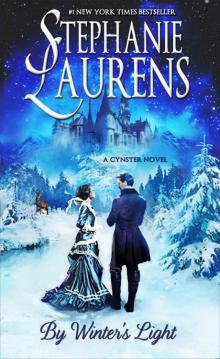 By Winter's Light: A Cynster Novel (Cynster Special Book 2)
By Winter's Light: A Cynster Novel (Cynster Special Book 2)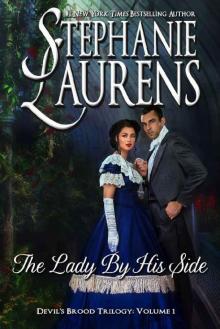 The Lady By His Side
The Lady By His Side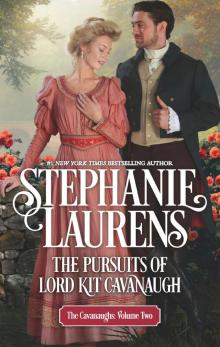 The Pursuits of Lord Kit Cavanaugh
The Pursuits of Lord Kit Cavanaugh Tangled Reins
Tangled Reins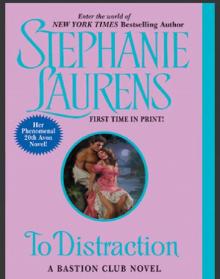 To Distraction
To Distraction A Rake's Vow
A Rake's Vow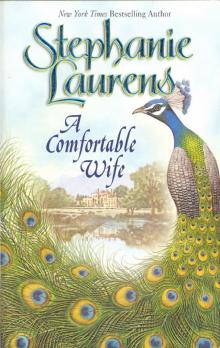 A Comfortable Wife
A Comfortable Wife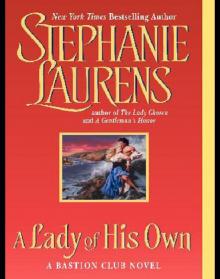 A Lady of His Own bc-3
A Lady of His Own bc-3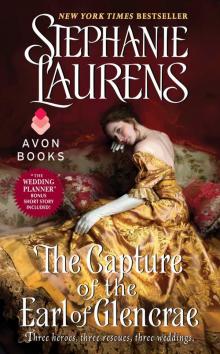 The Capture of the Earl of Glencrae
The Capture of the Earl of Glencrae Scandals Bride c-3
Scandals Bride c-3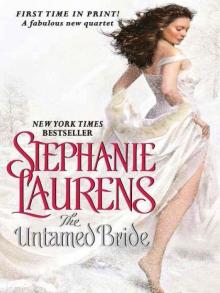 Untamed Bride
Untamed Bride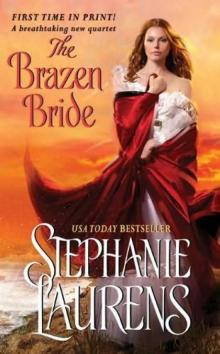 The Brazen Bride
The Brazen Bride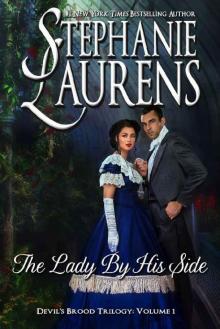 The Lady By His Side (Cynsters Next Generation Novels Book 4)
The Lady By His Side (Cynsters Next Generation Novels Book 4)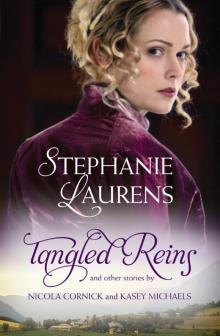 Tangled Reins and Other Stories
Tangled Reins and Other Stories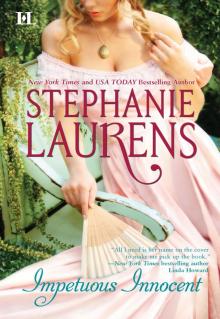 Impetuous Innocent
Impetuous Innocent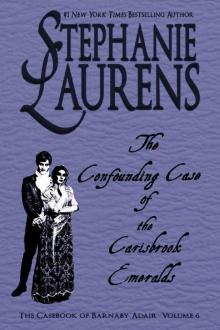 The Confounding Case Of The Carisbrook Emeralds
The Confounding Case Of The Carisbrook Emeralds Stephanie Laurens - B 6 Beyond Seduction
Stephanie Laurens - B 6 Beyond Seduction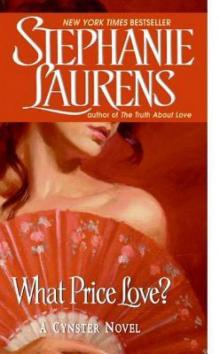 What Price Love?
What Price Love?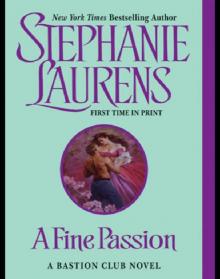 A Fine Passion
A Fine Passion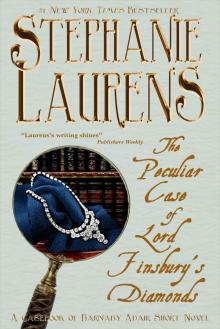 The Peculiar Case of Lord Finsbury's Diamonds: A Casebook of Barnaby Adair Short Novel (The Casebook of Barnaby Adair)
The Peculiar Case of Lord Finsbury's Diamonds: A Casebook of Barnaby Adair Short Novel (The Casebook of Barnaby Adair) Where the Heart Leads
Where the Heart Leads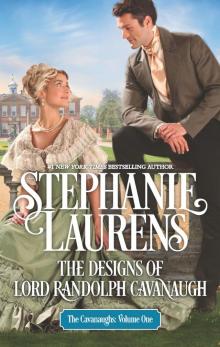 The Designs of Lord Randolph Cavanaugh
The Designs of Lord Randolph Cavanaugh A Secret Love c-5
A Secret Love c-5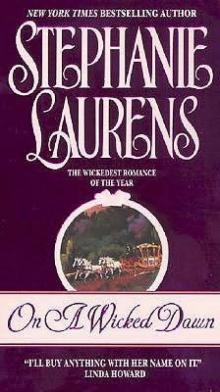 On a Wicked Dawn c-10
On a Wicked Dawn c-10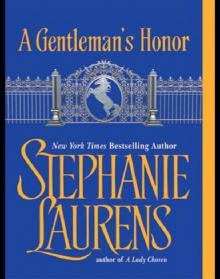 A Gentleman's Honor
A Gentleman's Honor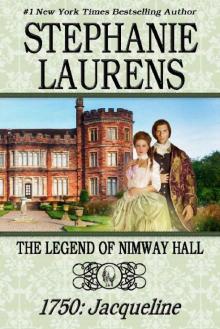 THE LEGEND OF NIMWAY HALL_1750_JACQUELINE
THE LEGEND OF NIMWAY HALL_1750_JACQUELINE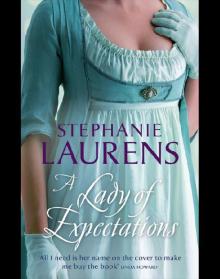 A Lady of Expectations
A Lady of Expectations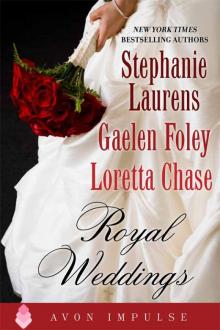 Royal Weddings: An Original Anthology
Royal Weddings: An Original Anthology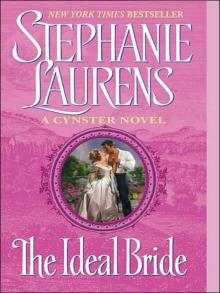 The Ideal Bride (Cynster Novels)
The Ideal Bride (Cynster Novels) Mastered by Love
Mastered by Love A Buccaneer at Heart
A Buccaneer at Heart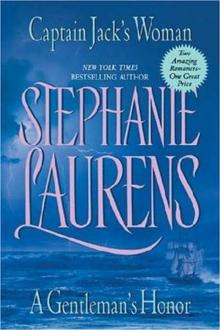 Captain Jack’s Woman / A Gentleman's Honor
Captain Jack’s Woman / A Gentleman's Honor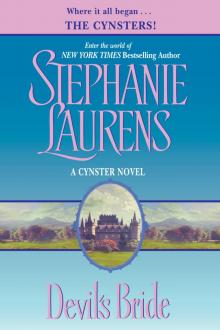 Devil's Bride with Bonus Material
Devil's Bride with Bonus Material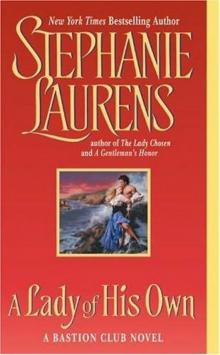 A Lady of His Own
A Lady of His Own A Secret Love
A Secret Love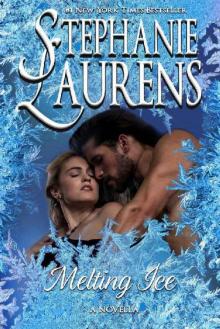 Melting Ice
Melting Ice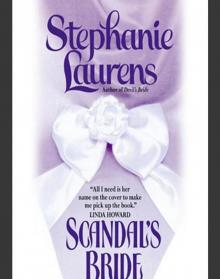 Scandal's Bride
Scandal's Bride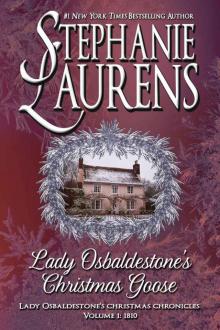 Lady Osbaldestone’s Christmas Goose
Lady Osbaldestone’s Christmas Goose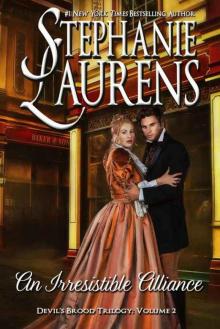 An Irresistible Alliance
An Irresistible Alliance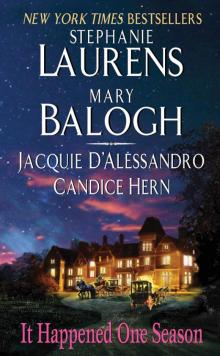 It Happened One Season
It Happened One Season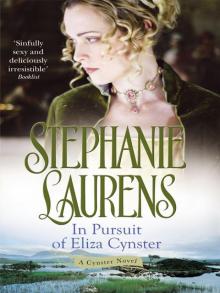 In Pursuit Of Eliza Cynster
In Pursuit Of Eliza Cynster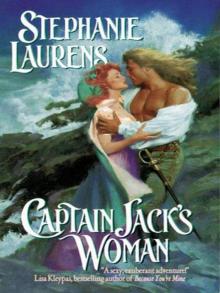 Captain Jack's Woman
Captain Jack's Woman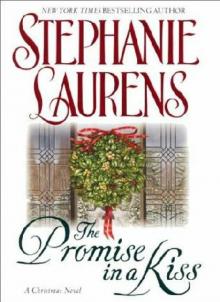 The promise in a kiss c-8
The promise in a kiss c-8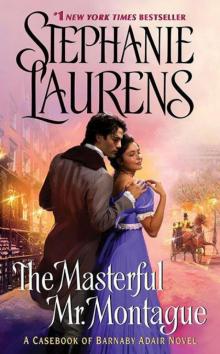 The Masterful Mr. Montague
The Masterful Mr. Montague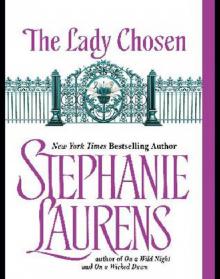 The Lady Chosen
The Lady Chosen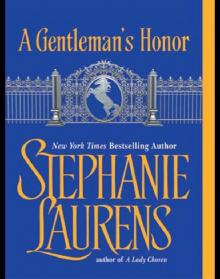 A Gentleman's Honor bc-2
A Gentleman's Honor bc-2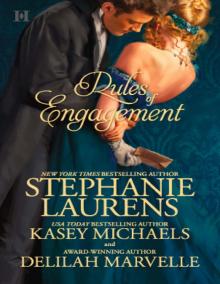 Rules of Engagement: The Reasons for MarriageThe Wedding PartyUnlaced (Lester Family)
Rules of Engagement: The Reasons for MarriageThe Wedding PartyUnlaced (Lester Family) Secrets of a Perfect Night
Secrets of a Perfect Night The Taste of Innocence
The Taste of Innocence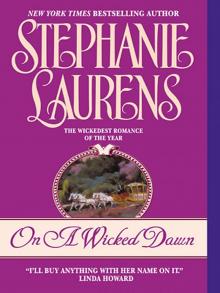 On A Wicked Dawn
On A Wicked Dawn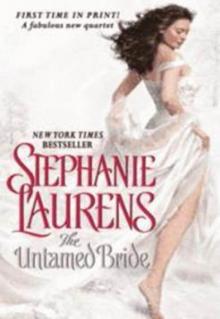 The Untamed Bride
The Untamed Bride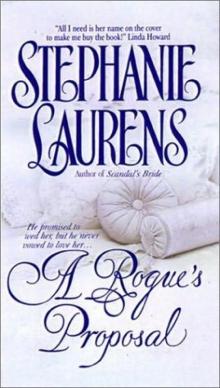 A Rogues Proposal c-4
A Rogues Proposal c-4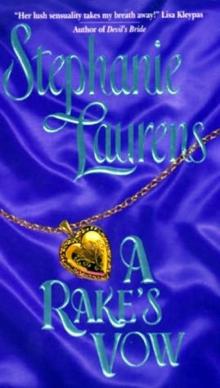 Rakes Vow c-2
Rakes Vow c-2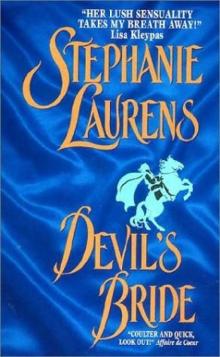 Devils Bride c-1
Devils Bride c-1 Hero, Come Back
Hero, Come Back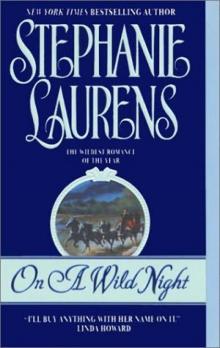 On a Wild Night c-8
On a Wild Night c-8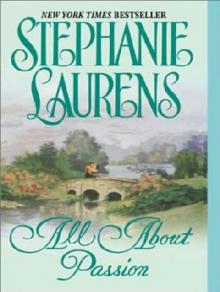 All About Passion c-7
All About Passion c-7